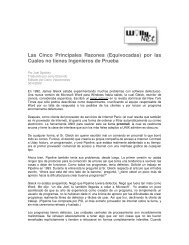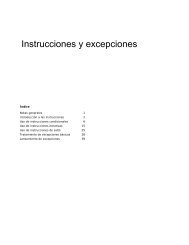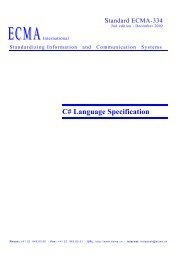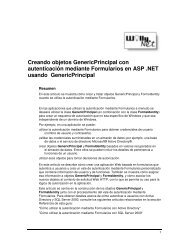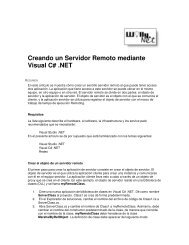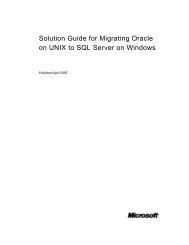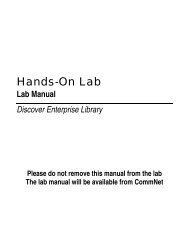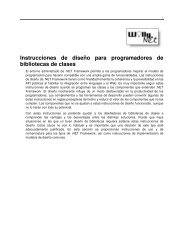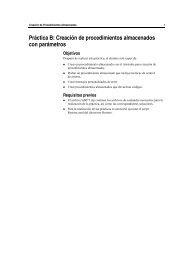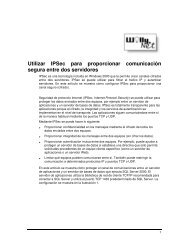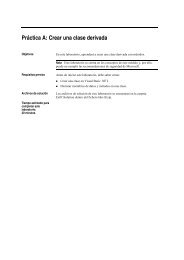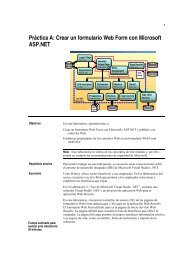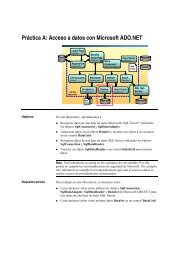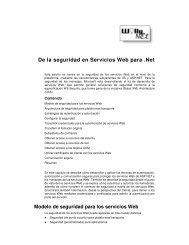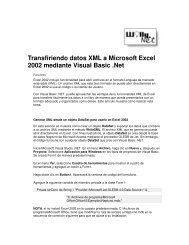Enterprise Library Test Guide - Willy .Net
Enterprise Library Test Guide - Willy .Net
Enterprise Library Test Guide - Willy .Net
Create successful ePaper yourself
Turn your PDF publications into a flip-book with our unique Google optimized e-Paper software.
88<br />
<strong>Enterprise</strong> <strong>Library</strong> <strong>Test</strong> <strong>Guide</strong><br />
Design test case Implemented? Feature that implements design<br />
Verify that the design addresses<br />
situations that can<br />
cause exceptions and that<br />
the application block logs the<br />
exceptions through the instrumentation.<br />
Yes<br />
For example, the LogWriter class includes<br />
the InstrumentationProvider property. This<br />
property retrieves the instrumentation provider<br />
that defines the events for the application<br />
block. It logs the events to WMI and to<br />
the event log.<br />
Verify that the instrumentation<br />
is implemented with loosely<br />
coupled events.<br />
Verify that the application<br />
block can use .NET trace<br />
listeners.<br />
Verify that the application<br />
block supports custom property<br />
collections for the custom<br />
trace listeners, custom formatters,<br />
and custom filters.<br />
Yes<br />
Yes<br />
Yes<br />
The methods in the LoggingInstrumentation-<br />
Provider class that raise the events bind to<br />
the methods in the LoggingInstrumentation-<br />
Listener class at run time.<br />
The SystemDiagnosticsTraceListenerData<br />
class configures .NET trace listeners so that<br />
the application block can use them.<br />
The CustomTraceListenerData class supports<br />
custom property collections for custom<br />
trace listeners. Similarly, the CustomFilter-<br />
Data class and the CustomFormatterData<br />
class support custom property collections for<br />
custom filters and custom formatters.<br />
After the code is implemented, you can review it to see if it satisfies its test cases.<br />
Table 4 lists the results of a code review for the Logging Application Block.<br />
Table 4: Logging Application Block Code Verification<br />
Code test case Implemented? Feature that is implemented<br />
Verify that the<br />
Logger façade<br />
exposes all public<br />
members as static<br />
and that it uses<br />
overloads to support<br />
Yes<br />
The Logger.Write method has multiple overloads to log<br />
messages that have different properties. Some of the<br />
overloads are shown in the following code examples.<br />
// writes a message to the category specified<br />
// in the log object<br />
public static void Write(LogEntry log){}<br />
different ways<br />
// writes a log entry to the default category<br />
public static void Write(object message){}<br />
to log information.<br />
// writes a log message to a specific category<br />
public static void Write(object message, string<br />
category){}<br />
// writes a log message to a specific category<br />
// and assigns a priority to the message<br />
public static void Write(object message, string<br />
category, int priority){}



